The federally constituted Board of the Kentucky Indiana transportation planning agency -KIPDA held a regular meeting on June 28th 2012 in the KIPDA building off Blakenbaker Lane in east Louisville. The meeting was chaired by the Mayor of Shively, Sherry Conner, shown to the right with Larry Chaney, Director of Transportation Planning at KIPDA and sipping coffee, Barry Barker of TARC.
The composition of regional transportation planning agencies is authorized by Congress in United States Code, 23 U.S.C. § 134(d)(2). Intentionally, or in a complete lapse of judgement, Congress gave the authority for regional transportation planning to local elected officials, state transportation agency officials, and “appropriate state officials.” See Reagan era
History of MPOs on Regional Trans page HERE
Good lobbying money was spent to get this statute written this way and it plays out as a huge victory for the status quo of the one percent. In an age of ‘corporations are people too’ putting elected officials in charge of regional planning without also authorizing effective oversight and checks on the result, means the local officials pander to the desires of local monied interests and help effectuate their commercial expansion.
Since the corporations have a major investment in continuing the unsustainable conspicuous consumption lifestyle of the 50s-- selling cars to drive to suburban Malls- the great ideas necessary to position Metro Louisville for the future are being drowned in short sighted sprawl.

Big corporate power and big political power are alloyed and controlling the regional planning agency for both regional economic development and transportation planning. The resulting future looks like a paradise for big corporations, shippers, auto and appliance manufacturers and warehouse men, the major players in the local economy. These business interests elect the local officials with their major donations and political links into the power structure.
The problem is, the corporate mandarins are focused on the next quarter profits and their influence through elected local politicians is forcing KIPDA to plan for bridges and concrete driveways to the front door of the industrial park, instead of solving historic segregation and lack of connectivity in the west end of Louisville. The bottom line near term focus also means this critical public agency is not preparing the community for the coming crisis in global warming climate change and the emergency reductions in green house gases (GHG) that will be mandated.
The Board members lack the initiative to advance progressive transportation planning to address global warming, socio-economic injustice and a second economic recession or depression that looms ahead. The planning is mired in the polluting ideas of the past, building more concrete highways and bridges to serve single occupant vehicles burning ever more millions of gallons of hydrocarbons and emitting more and more GHG.

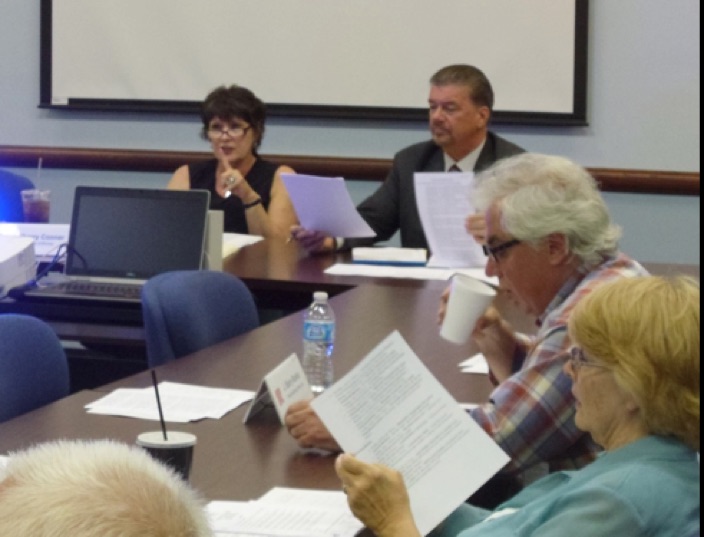
KIPDA’s regional planning authority is being used to make the future look like the past
Below, David Blank, takes advantage of his three minute opportunity to address the KIPDA Board and ask for 5% of bridge toll money be assigned to TARC. The citizen comment period occurs at the beginning of the meeting and is not part of the action items on the agenda. Groups looking to address the board in a more thoroughgoing manner need to call ahead and get time on the agenda and include a request for action. Proposals for KIPDA to do things differently would have be aware of the authorizing statutes and rules.
Local officials are generally not the best longterm regional transportation planners. Getting re-elected to office is their foremost concern, and it is a rare politician that will buck the priorities of the party to innovate new policy. Regional politicians tend to serve the business concerns of major donors and their influence groups.
Though KIPDA has a staff of college trained planners, their wings have been clipped by the politicians and their high technical capability harnessed to making the best job of repeating the 60s era transportation system. No one in the KIPDA technical staff can buck this system and stay employed.
Outside groups looking at the situation and hoping to have some impact cannot be successful against the deep pockets of the business establishment and its well cemented political system. KIPDA needs a Title VI committee that reports on the violence and poverty of the West End, the progress of the West End Working Group, and free wheeling ideas for correcting the economic disinvestment that has gone on too long. Such focused problem solving will have to result in funded projects for major connectivity improvements so that the millions spent arresting and jailing poor people can be freed up to expand employment opportunity and improve the community.
Its not surprising that the west end could fall through the cracks at KIPDA. This board has one African American sitting in a sea of white faces.
“The Louisville region needs a well thought out and coordinated transportation plan. Horizon 2030, our region’s long range transportation plan, is simply a listing of projects sponsored by individual agencies of the local and the state governments.”
Partnership for a Green City Climate Action Report
April 22, 2009
The persons planning the millions of dollars of expenditures in the federally-assisted transportation projects are now simply adding more concrete roads and steel bridges in a repeat of the 60s era superhighway boom. We are now several decades into seeing what the community and environmental impact is, of selling millions of rubber tired heavy metal cars to urban populations. The result is toxic and polluting stormwater runoff that poisons the life in Kentucky streams and leaves contaminated sediments with decades of harm.
The corporate mindset cannot break free of the profit imperative and must make plans to sell more consumer goods using coal generated electric power, and serving the needs of a commuting population taught to attain status by accumulating the most toys before dying an early death of cancer or heart disease whose causes somehow elude the medical establishment though the subject population swims in a sea of ultra-fine particulate polluted air of toxic particles emitted by the automobile and diesel vehicle fleet. (whew!)
The organizations that Congress had intended to see farther than the next quarter bottom line cannot do that job that progress in urban transportation planning has equipped them to do--to boldly break from the past and design efficient, sustainable transportation that is now an absolute requisite for continued progress and peaceful human society, KIPDA will need to break free of the developers.
The regional planning power designated to KIPDA is an awesome power to make the future livable. If KIPDA is controlled by for profit corporation interests, the future is in very dire straits.
The KIPDA Board is the MPO --the federally created metropolitan planning agency. The MPO elected official structure and the weak language of the law, has allowed local business to pull KIPDA away from what good planning directives exist in the federal policy --
23 U.S.C. § 134
-
(a)Policy.— It is in the national interest to—
-
(b)
(1) encourage and promote the safe and efficient management, operation, and development of surface transportation systems that will serve the mobility needs of people and freight and foster economic growth and development within and between States and urbanized areas, while minimizing transportation-related fuel consumption and air pollution through metropolitan and statewide transportation planning processes identified in this chapter; and
(2) encourage the continued improvement and evolution of the metropolitan and statewide transportation planning processes by metropolitan planning organizations, State departments of transportation, and public transit operators as guided by the planning factors identified in subsection (h) and section 135 (d).
(h) Scope of Planning Process.—
(1) In general.— The metropolitan planning process for a metropolitan planning area under this section shall provide for consideration of projects and strategies that will—
(A) support the economic vitality of the metropolitan area, especially by enabling global competitiveness, productivity, and efficiency;
(B) increase the safety of the transportation system for motorized and nonmotorized users;
(C) increase the security of the transportation system for motorized and nonmotorized users;
(D) increase the accessibility and mobility of people and for freight;
(E) protect and enhance the environment, promote energy conservation, improve the quality of life, and promote consistency between transportation improvements and State and local planned growth and economic development patterns;
(F) enhance the integration and connectivity of the transportation system, across and between modes, for people and freight;
(G) promote efficient system management and operation; and
(H) emphasize the preservation of the existing transportation system.
(2) Failure to consider factors.— The failure to consider any factor specified in paragraph (1) shall not be reviewable by any court under this title or chapter 53 of title 49, subchapter II of chapter 5 of title 5, or chapter 7 of title 5 in any matter affecting a transportation plan, a TIP, a project or strategy, or the certification of a planning process.
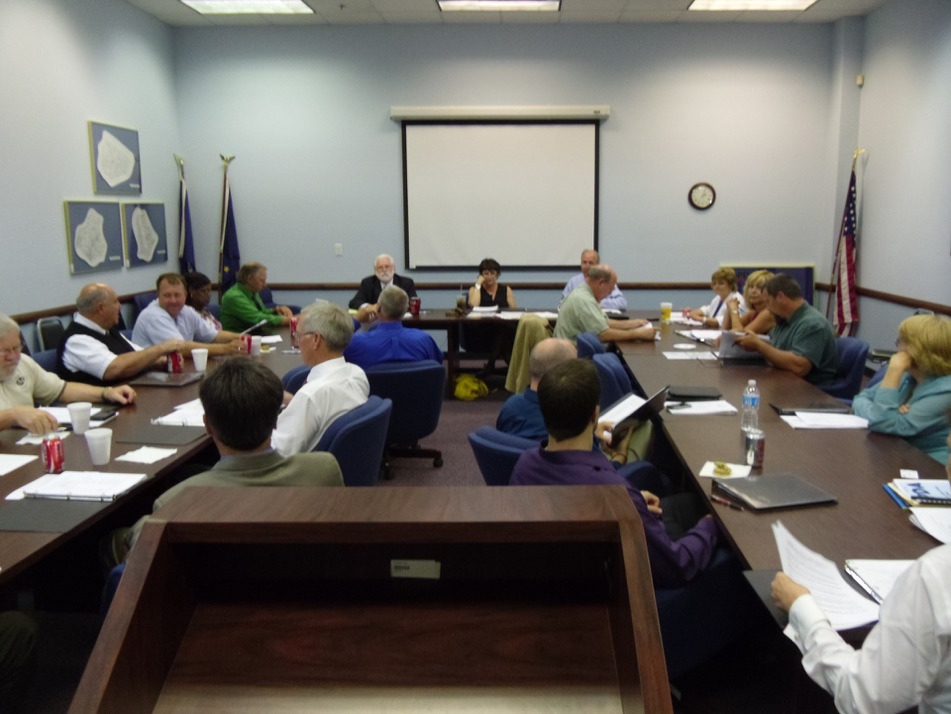
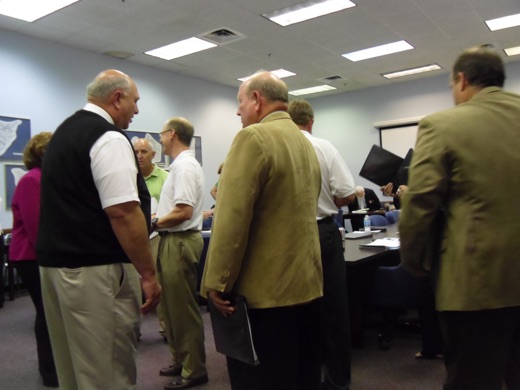
Some Board members milling about during the break between the Transportation Panning Committee meeting and the Board meeting.
I made the same charges in the Comments to the Ohio River Bridges Project and this Response was included in the Revised Rule of Decision-- on pages 91-92 of the RROD
Hixson-9
The LSIORBP adopts and incorporates the [same] Purpose and Need from ORMIS. [Ohio River Major Investment Study]
The discriminatory regional plans of the MPO, constructed without NEPA oversight, gave little weight to the connectivity problems of the Title VI area and the failing TARC system.
The regional politicians on the TPC were too attentive to east end and southern Indiana business interests when they formulated the Purpose and Need, and gave little heed to the discriminatory effect of the two bridges plan. The FSEIS perpetuates the discrimination.
This is an adoption of right wing trickle down theory – that by giving all the support to economic growth in outer rings of the suburban region, [somehow] poor people trapped in the ghetto will eventually benefit. The past ten years have shown this to be a sham.
See the Record of Decision HERE
See Regional Transportation webpage HERE
See the Social Justice webpage HERE
Response The metropolitan planning process is a federally prescribed, consensus-based local transportation planning process, which involves representatives of local jurisdictions to
ensure that local land use plans and knowledge of local economic conditions are taken into account. (See 23 CFR Part 450.)
The metropolitan planning process includes public involvement, as well as a process for compliance with Title VI.
The input serves as the basis for the transportation planning decisions embodied in the MPO’s long-range transportation plan. FHWA reviews the MPO’s planning process on a regular basis to
ensure that the planning process satisfies all applicable federal requirements. FHWA has reviewed the Louisville MPO’s planning process and certified that the MPO is in compliance with federal requirements, as specified in 23 CFR Part 450, including Title
VI of the Civil Rights Act.
In developing the purpose and need for the LSIORB Project, it is appropriate to rely on the transportation goals identified by the MPO in its transportation plan.
In fact, FHWA’s guidance encourages consideration of metropolitan transportation plans when developing the purpose and need for a transportation project. (See Appendix A of 23
CFR Part 450.)
The Treasury Department, in an April assessment [PDF], put the total lost household wealth at $19.2 trillion.
Other factors including global environmental climate change, international security and the war against al Qaeda, the European financial system instability, make 2012 a different world from 2003. As much as automotive manufacturers, petroleum products producers, shopping mall operators and other major players would like to bring back the 60s, its not going to happen.
The critically important regional planning agency must take into account these new parameters --not try to deny or ignore them. The major manufacturers would be smarter to start selling us the sustainable products and lifestyles of the next economic and social order, rather than hold on until their backward looking markets collapse beneath them.
The world is going to face major environmental challenges in global warming that will necessitate vast reductions in GHG emissions, probably sooner rather than later. Major economic and social dislocations are coming if local politicians cannot be persuaded to let regional planning be informed by the emerging science. The future will not look like the past.
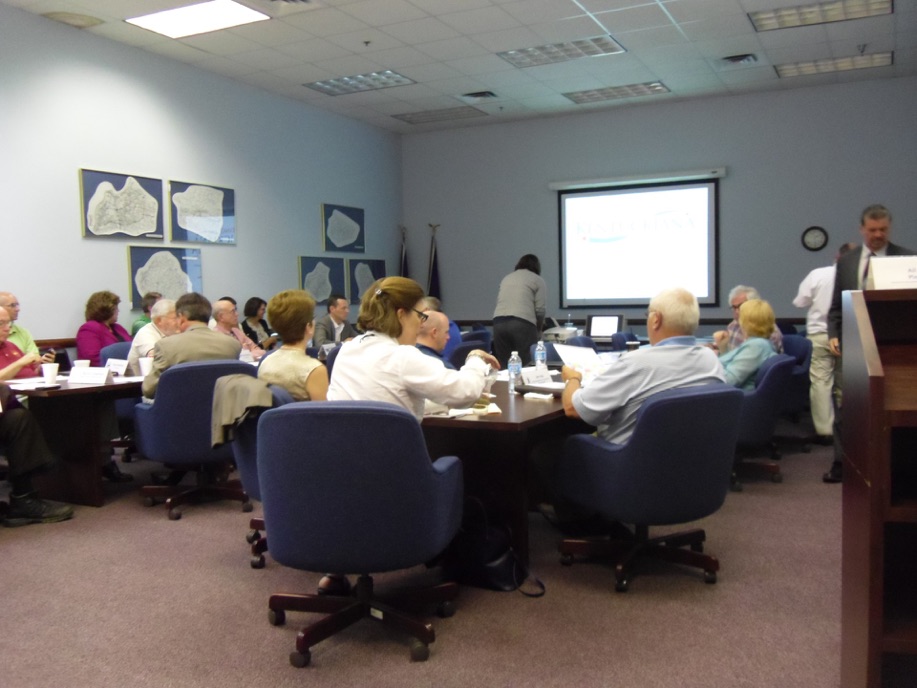
Environ. Sci. Technol. 2012, 46, 6455−6469 June 2012 issue
Review of Methane Mitigation Technologies with Application to Rapid Release of Methane from the Arctic
Joshuah K. Stolaroff,* Subarna Bhattacharyya, Clara A. Smith, William L. Bourcier, Philip J. Cameron-Smith, and Roger D. Aines
Lawrence Livermore National Laboratory, Livermore, California, United States
"Significant gaps in understanding remain of the mechanisms, magnitude, and likelihood of rapid methane release from the Arctic. Methane may be released by several pathways,
including lakes, wetlands, and oceans, and may be either uniform over large areas or concentrated in patches. Across Arctic sources, bubbles originating in the sediment are the most important mechanism for methane to reach the atmosphere."
"In addition to the warming effect of current forcing and
emissions, methane plays a role in climatic feedback
mechanisms that can exacerbate warming and even lead to
abrupt, catastrophic climate change in the future. This risk is
primarily associated with the rapid release of carbon stores in
the Arctic due to warming, leading to higher atmospheric
methane levels, especially in the Arctic. Warming due to higher
Arctic concentrations, in turn, leads to additional methane
releases in a positive feedback cycle.
Hoosier Environmental Council, Inc. v. United States Army Corps of Engineers, 105 F.Supp.2d 953 (S.D.Ind. 2000)
United States District Court, Seventh Circuit
“All five counties fall within the jurisdiction of the Kentuckiana Regional Planning and Development Agency ("KIPDA"), which is the metropolitan planning organization ("MPO") designated for the urbanized area of Louisville, Kentucky, under federal transportation laws. See 23 U.S.C. § 134(b).
The purpose of an MPO is to "develop transportation plans and programs for urbanized areas of the State," that will meet the objective of encouraging and promoting safe and efficient management, operation and development of surface transportation systems and foster economic growth and development. Id. § 134(a).
To accomplish this purpose, an MPO must develop transportation improvement plans and programs in cooperation with the State, and update them once every two years. 49 U.S.C. § 5304(a).
This planning process requires consideration of seven specifically-identified factors. 23 U.S.C. § 134(f). Those factors include the economic vitality of the metropolitan area, safety and security of the transportation system, increased accessibility and mobility options, protecting and enhancing the environment (including promoting energy conservation and improving the quality of life), enhancing the integration of transportation systems, promoting efficient system management and operation, and preservation of the existing transportation system. Id.
When an MPO's regional area is designated as nonattainment under the CAA for ozone or carbon monoxide, the MPO must develop long range plans that are in conformity with the SIPs for the relevant states. 23 U.S.C. § 134(g)(3). In other words, the plans must conform with the SIP's "purpose of eliminating or reducing the severity and number of violations of the [NAAQS] and achieving expeditious attainment of such standards." 42 U.S.C. § 7506(c)(1)(A).
Conformity also means that the planned activities will not "cause or contribute to any new violation of any standard," increase any existing violation, or delay timely attainment for the area. Id. § 7506(c)(1)(B).”
KRS 61.805 Definitions for KRS 61.805 to 61.850.
(2) "Public agency" means:
(a) Every state or local government board, commission, and authority;
(b) Every state or local legislative board, commission, and committee;
(c) Every county and city governing body, council, school district board, special district board, and municipal corporation;
(d) Every state or local government agency, including the policy-making board of an institution of education, created by or pursuant to state or local statute, executive order, ordinance, resolution, or other legislative act;
(e) Any body created by or pursuant to state or local statute, executive order, ordinance, resolution, or other legislative act in the legislative or executive branch of government;
(f) Any entity when the majority of its governing body is appointed by a "public agency" as defined in paragraph (a), (b), (c), (d), (e), (g), or (h) of this subsection, a member or employee of a "public agency," a state or local officer, or any combination thereof;
(g) Any board, commission, committee, subcommittee, ad hoc committee, advisory committee, council, or agency, except for a committee of a hospital medical staff or a committee formed for the purpose of evaluating the qualifications of public agency employees, established, created, and controlled by a "public agency" as defined in paragraph (a), (b), (c), (d), (e), (f), or (h) of this subsection; and
(h) Any interagency body of two (2) or more public agencies where each "public agency" is defined in paragraph (a), (b), (c), (d), (e), (f), or (g) of this subsection;
KIPDA is a Kentucky special district required to follow Open Meetings Laws
WHAT IS A SPECIAL DISTRICT?
For the purpose of this manual, “special district” is used to refer to districts that fall under the definitions in 65.005, 65.060 and 65.180 of the Kentucky Revised Statutes. These districts are
independent, political subdivisions of the state, government entities called "authorities" and "special districts." They exercise less than statewide jurisdiction and are organized for the
purpose of performing governmental or other prescribed functions within limited boundaries.
Special districts are created to fill the gaps that may exist in the services counties provide and the services the residents may desire.
Special districts have various financial powers, which may include, but are not limited to, the powers to tax and/or assess fees for services. At the same time, special districts must be
publicly accountable, which means, among other things, they must hold open meetings, properly notice all meetings, keep minutes and other records, which are open for inspection by
any citizen, adopt annual budgets, and submit to annual financial documentation and audits. In addition, they must maintain appointment provisions for a governing board of directors.
65.160 Special districts may be formed by two or more counties.
(1) Upon approval of the fiscal courts of the counties involved, two (2) or more counties may join together to form a special district to fulfill any purpose which any individual county is presently authorized to fulfill or may be authorized to fulfill in the future.
(2) The membership of the governing body of such multi-county special districts shall be apportioned among the counties in ratio to their population, with each county having at least one (1) member.
-
(3)Members of the governing body of multi-county special districts may be removed from office as provided by KRS 65.007.
96-ORD-135
June 12, 1996
In re: ElderServe, Inc./ Kentuckiana Regional Planning and Development Agency
OPEN RECORDS DECISION
The issue in this appeal is whether KIPDA properly relied on KRS 61.878(1)(c)1. in partially denying ElderServe's open records request. For the reasons set forth below, we conclude that KIPDA did not meet its statutory burden of proof in denying ElderServe access to the disputed records under the cited exemption. Additionally, we find that KIPDA's responses were procedurally deficient.
. . .
To the extent that KIPDA failed to cite a specific exception authorizing nondisclosure in its original response, and failed to briefly explain how the exception cited applies to the records withheld in its second response, it violated the procedural requirements of the Open Records Act. We urge KIPDA to review KRS 61.880(1) to insure that future responses conform to the Act. If the requested records are in active use, in storage, or not otherwise immediately available, KIPDA should refer to KRS 61.872(5) to determine its obligations under the Act.
Partnership for a Green City Climate Action Report April 22, 2009
available for download on the Metro Government webpage
The impacts of transportation policy on human health go far beyond highly visible auto accidents to
include access to health care, food services and community support services. In the absence of an
adequate public transportation system, the result could be intense isolation and a widening of disparities
between car and non-car households that is likely to most seriously affect the poorest of the poor
Civil rights and equity issues affecting minorities have been found to be linked to transportation policy
decisions that give funding preference to projects (such as light rail and highways) that serve suburban
and/or wealthier commuters and consistently under-fund the infrastructure that is most valuable to poor
and minority populations. Notably, "[i]n 1998, those in the lowest income quintile, making $11,943 or
less, spent 36% of their household budget on transportation, compared with those in the highest income
quintile, making $60,535 or more, who spent only 14%.”
4.3.1.1 Integrate Land Use and Transportation Planning
The promotion of compact and transit-oriented development patterns is potentially one of the most
effective strategies to reduce GHG emissions from transportation in the long-term, but it also requires a
great degree of collaboration among agencies and among plans. Transportation planning that considers
cross-linkages with land use plans and involves agencies with jurisdiction over those plans will ensure
that transportation investment decisions support a regional vision for growth. The Louisville region
needs a well thought out and coordinated transportation plan. Horizon 2030, our region’s long range
transportation plan, is simply a listing of projects sponsored by individual agencies of the local and the
state governments. The Cornerstone 2020 Comprehensive Plan’s chapter titled “Mobility Strategy”
addresses many of the factors identified below, but lacks the specific roles/responsibilities, priorities,
implementation activities and schedule that a strategy requires.
Recommendation 123:
LMG and KIPDA should develop a mobility strategy for Louisville. The new strategy will form
the foundation of an integrated multi-modal transportation plan focused on mobility for people
and freight.
4.3.1.2 Transit-Oriented Development
Well-planned communities that offer a variety of transportation options and attractive urban
neighborhoods are better positioned to sustain long-term investment prospects. Cities like Austin,
Denver, Madison and Chicago have programs underway that integrate economic development,
transportation and land use strategies. This new type of program is an integral part of planning for a vital
city. Studies in historical (traditional) non-integrated development have pointed out the sprawl that
occurs without this type of planning. In addition, “[b]y fostering or requiring low density development with a high separation of uses, Euclidean zoning is one of the great generators of suburban sprawl, with all of its environmental, economic, and social costs.” 28
Most development in Louisville is occurring at densities and locations that do not support multi-modal
activity or mass transit. This needs to be addressed by promoting high density/mixed-use development
along transit service routes to encourage reduction of vehicle miles traveled (VMT) through transitoriented development (TOD).
Recommendation 124:
LMG, KIPDA, developers and the public should promote and invest in transit-oriented
development as a way of planning for more livable, sustainable communities through the
integration of transit and development at the regional, community, corridor and neighborhood
levels.
4.3 Transportation Greenhouse Gas Emissions
In 2006, Louisville Metro GHG emissions from transportation accounted for 29.2% of inventoried GHG
emissions. Sources in this sector, which includes onroad and nonroad (e.g., construction equipment,
lawn care, agricultural, rail) vehicles in Jefferson County, released 5.6 million tons of CO2e emissions.
Since the transportation sector accounted for such a large portion of the local GHG emissions, it
warrants investigation as to how to reduce these emissions. A significant portion of these transportation
related emissions results from to single occupancy vehicles.
Nationally, according to EPA inventory data for 2003, the transportation sector is the source of 29% of
U.S. GHG emissions. This sector is the fastest-growing source of U.S. GHGs, accounting for 47% of the
net increase in total U.S. emissions since 1990. Transportation is also the largest end-use source of CO2, which is the most prevalent greenhouse gas.24 Production of CO2 is related to the amount of fuel
combusted and its carbon content. The emission rate of CO2 cannot be affected by vehicle emissions
control technologies. Methane and nitrous oxide (N2O), also significant GHGs, can be affected;
however, they only account for a small percent of the transportation sector’s GHG total (2% nationally
in 2003).
Much of the development that has occurred in the greater Louisville region over the last 50 years has
been predicated on automobile ownership. As a result, the percentage of people who travel by car for
work during 2007 was 96.3%.26Also, total trips by TARC in 2009 were estimated to be only 2.4% of all
vehicle trips in the county.27 According to KIPDA, since 1980, the amount of driving done by
Kentuckians rose at a rate 4.6 times the rate of population growth, though nationally the rate is three
times faster than population.
The recommendations that follow attempt to address locally the goals expressed in the U.S. Mayors’
Climate Protection Agreement, especially the primary goal of reducing GHG emissions 7% below 1990
levels by 2012. This Report presents analysis and strategies to help the Louisville Metro area meet this
GHG reduction goal as well as acting as a guide for improving Louisville Metro’s quality of place. The
more livable a metro area is, the more population retention it experiences and the more prosperous it
becomes by attracting and retaining vital industry and business interests. Many strategies intended to
reduce transportation sector emissions depend more on policies and programs shaped at the national,
state and regional level than the local level; nevertheless, as the “Greater Louisville Project, 2005
Competitive City” has clearly stated: “NOW is the time to forge a broad community consensus to
formulate a comprehensive mobility strategy.”
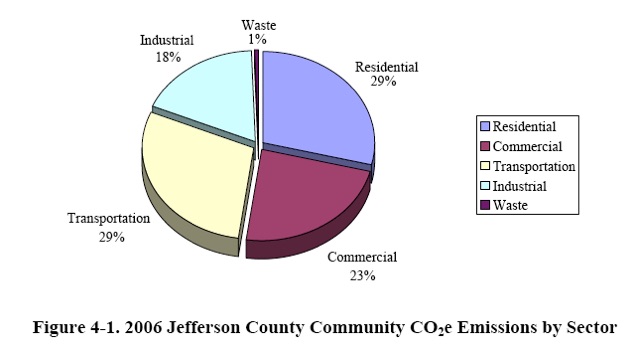
In the late 90s about the same time a land rush opened up at the new RiverRidge industrial park at the old ammunition plant in southern Clark County, it became vastly more desirable --to monied interests --to build the east end bridge to serve the industrial development. In a tug of war of political and economic interests, KIPDA and the Ohio River Major Investment Study --ORMIS, delivered the Two Bridges Mega Project proposal, followed by the 2003 EIS and ROD for the Bridges Project.
Then, the housing bubble collapsed, thousands faced foreclosure from sub prime loans, and the resulting bad debts caused the federal financial system bailout with the loss of trillions of dollars of American personal and business wealth. See the cost of the financial system collapse--
A major release of Arctic methane would have a devastating
impact on the global climate and air quality, and evidence
indicates it has played a role in past warming events in the
paleoclimate record."
"Climate-feedback risks aside, reducing methane emissions
has been identified as a low cost, near-term approach to climate change mitigation. Moreover, in light of continuing failure to address global CO2 emissions, recent analyses recommend a strategy of aggressive reductions in “short-lived climate forcers,” i.e., methane and black carbon, as an alternative approach to limit warming in the next few decades. Reductions in short-lived forcers open an emissions path for CO2 that can still avoid dangerous levels of warming, and have substantial cobenefits for human health and crop yields."